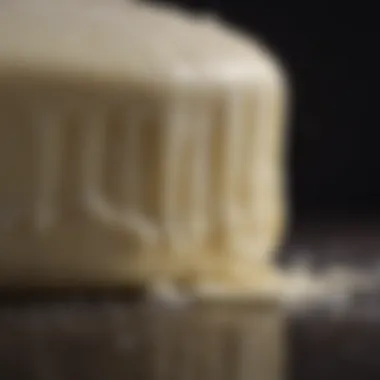Discovering the Health Benefits of Mozzarella Cheese


Intro
Mozzarella cheese often brings to mind visions of cheesy pizzas and delightful pasta dishes. However, its hidden depths extend far beyond its culinary appeal. As we explore mozzarella cheese, especially its nutritional and probiotic properties, we uncover a myriad of health benefits that can significantly impact our well-being.
Understanding the role of mozzarella in modern diets is crucial. The fermentation process involved in its production not only cultivates its distinct flavor but also enriches it with live cultures — vital microbes that contribute to improved gut health. This exploration isn't just for food enthusiasts; nutritionists, health professionals, and wellness coaches can find significant insights here.
Notably, the inclusion of mozzarella cheese can foster meaningful dietary choices for individuals aiming to enhance their health. delving into the components of this dairy product, we can appreciate its benefits and the implications for digestive well-being.
In essence, this discussion seeks to highlight the remarkable properties of mozzarella cheese and enhance the understanding of how it can play an integral role in our daily nutrition.
Prologue to Mozzarella Cheese
Mozzarella cheese is not just a culinary delight; it represents a significant crossroads where flavor meets functionality. Its creamy texture and mild taste have made it a staple in kitchens around the world. However, it is essential to look beyond the surface to unveil its multifaceted character, particularly its role as a source of probiotics. Understanding mozzarella begins with recognizing its rich history and various forms.
Origins and Variations
Mozzarella cheese traces its roots back to Italy, with legends pointing towards its origins in the southern regions, particularly Campania. Originally made from water buffalo's milk, mozzarella enjoys a prominent status in Italian cuisine—think of the classic Margherita pizza. Over time, various adaptations emerged, leading to variations such as cow’s milk mozzarella, burrata, and even smoked mozzarella. Each version showcases unique flavor profiles and textures, catering to different culinary uses.
The traditional method of producing mozzarella, known as pasta filata, involves stretching and kneading the curds. This process not only affects the cheese's consistency but also the flavor intensity, which is often enhanced by regional grazing practices and methods.
Nutritional Composition
Nutritionally, mozzarella holds its ground well. It’s low in calories, yet high in protein, making it a favorable inclusion in any diet. A typical serving offers a decent amount of calcium, essential for bone health, along with significant vitamins such as B12, which supports energy metabolism. Additionally, mozzarella contains probiotics, beneficial bacteria that play a crucial role in digestive health.
Key nutritional highlights of mozzarella include:
- High-quality protein, essential for muscle maintenance
- Calcium abundance, vital for strong bones
- Vitamin B12, for energy and optimal body function
Incorporating mozzarella into the diet not only satisfies taste buds but also bolsters nutritional value. As health professionals emphasize balanced diets, mozzarella's attributes make it a keen contender in wellness discussions.
Understanding Probiotics
Understanding probiotics is essential for grasping the broader topic of health benefits tied to mozzarella cheese. Probiotics are often referred to as "good bacteria" that play a key role in maintaining gut health. They are living microorganisms that, when consumed in adequate amounts, confer a health benefit to the host. This section aims to dissect this concept, shedding light on why probiotics are more than just a fad in health circles. It emphasizes their invaluable contribution to digestion, immune function, and even mood regulation.
Definition and Types of Probiotics
Probiotics have garnered considerable attention recently, yet when one digs deeper, the definitions can vary widely. Essentially, probiotics are described as live microorganisms which, when administered in sufficient quantities, offer a health benefit, often improving the balance of gut microflora. There exist diverse types of probiotics, categorized primarily based on their genera, species, and strain.
Some well-known types include:
- Lactobacillus: Found in yogurt and other fermented foods, this strain is known for its efficacy in lactose digestion.
- Bifidobacterium: This strain thrives in the intestines and is thought to inhibit harmful bacteria.
- Saccharomyces boulardii: A yeast probiotic that’s particularly useful during antibiotic treatments and gastrointestinal disorders.
Each type has unique properties and benefits, making the landscape of probiotics rich and complex. The precise functionality varies from improving digestion to enhancing immune response. In the case of mozzarella cheese, the focus tends to lean towards Lactobacillus varieties, which contribute not only to flavor but also to health benefits.
Role in Gut Health
The gut is a remarkable ecosystem, housing trillions of microorganisms, many of which are pivotal to our health. Probiotics have been shown to positively influence this ecosystem by:
- Restoring microbiota balance: An imbalance in gut bacteria can lead to a range of issues, from diarrhea to allergies. Probiotics help restore this balance.
- Promoting digestion: They can enhance digestion by breaking down food more efficiently, which is particularly relevant for lactose intolerant individuals.
- Supporting immune system: A healthy gut contributes to a fortified immune system. Nearly 70% of the immune system resides in the gut, making probiotics a frontline defense mechanism.
Moreover, there is growing interest in how probiotics might play a role in mental health, linking gut health to mood regulation due to the gut-brain axis. In summary, the role of probiotics extends far beyond mere digestion; they are vital players in overall health, tying into the nutritional narrative surrounding mozzarella cheese.


"The gut microbiome is a developing internal environment, influencing not just digestion but the entire human experience, including our emotional well-being."
This exploration of probiotics highlights both their multifaceted nature and their importance in a holistic approach to health. As we delve into the next sections, the connection between mozzarella cheese and these beneficial microorganisms will become even clearer.
Mozzarella Cheese as a Probiotic Source
Understanding what makes mozzarella cheese a significant dairy product goes beyond its creamy texture and pleasing flavor. This soft cheese not only adds a delightful touch to dishes like pizza and caprese salad but also serves as a notable source of probiotics. The probiotics found in mozzarella can play an essential role in supporting overall health, particularly gut health, which is becoming increasingly recognized within the nutrition and wellness community. This section will explore the live cultures present in mozzarella as well as how it compares with other cheeses in terms of probiotic content and health advantages.
Live Cultures in Mozzarella
Mozzarella cheese is not just a taste sensation; it contains live cultures that can contribute positively to digestive health. The primary bacterial strains found in mozzarella include Lactobacillus, Streptococcus, and Enterococcus. These friendly bacteria help balance the gut microbiome, which is crucial for effective digestion and nutrient absorption.
- Gut Flora Balance: By introducing these beneficial bacteria into the digestive system, mozzarella may help crowd out harmful pathogens, leading to improved gut flora balance.
- Lactose Digestion: Those with lactose intolerance often struggle with dairy products. Interestingly, some studies suggest that the live cultures in mozzarella can aid in the digestion of lactose, potentially making it easier for lactose-sensitive individuals to consume cheese without discomfort.
- Immune Support: Furthermore, probiotics are known to support immune function. By enhancing gut barrier function and reducing inflammation, mozzarella might contribute to a more robust immune response.
"Including mozzarella cheese as part of a balanced diet can enhance not just flavor but also gut health through its probiotic content."
Comparison with Other Cheeses
When evaluating mozzarella alongside other cheese types, it's evident that not all cheeses pack the same probiotic punch. Hard cheeses like cheddar and gouda often undergo different processes that can affect their live culture content.
- Probiotic Density: Mozzarella typically has a higher moisture content than aged cheeses, which may enable it to maintain more live bacteria. Aged cheeses often lose some of their probiotics during the aging process, whereas mozzarella, especially when made with traditional methods, retains significant amounts.
- Freshness Matters: Fresh mozzarella, in particular, is an excellent probiotic source. Artisan varieties that are crafted with minimal processing tend to have richer bacterial profiles compared to mass-produced versions.
- Unique Bacterial Strains: Different cheeses host various strains of probiotics. While mozzarella boasts certain species, others like blue cheese may feature unique strains like Penicillium. Therefore, incorporating a variety of cheese types in one's diet can provide a broader range of probiotics.
In summary, mozzarella cheese emerges not only as a culinary favorite but as a probiotic powerhouse that may foster gut health and overall wellness. As our understanding of the microbiome evolves, so too does our appreciation for everyday foods like mozzarella, which do more than merely satisfy our taste buds.
Health Benefits of Mozzarella
The exploration of mozzarella cheese transcends the mere enjoyment of its taste and texture; understanding its health benefits is crucial in today's health-conscious environment. This section aims to illuminate how mozzarella can play a significant role in one's dietary habits, emphasizing its digestive support, unique nutritional profile, and potential influences on weight management. Such information is particularly relevant for health professionals, wellness coaches, nutritionists, fitness trainers, and mindfulness instructors, as it aids them in promoting healthful dietary practices.
Digestive Support
One of the key benefits of consuming mozzarella cheese lies in its potential to bolster digestive health. The live cultures present in mozzarella, a byproduct of its production process, can serve as probiotics. These microorganisms actively contribute to a balanced gut flora, essential for optimal digestion.
- Probiotics and Gut Bacteria: Probiotics are often touted as the good soldiers fighting against the bad bacteria that can cause digestive disturbances. Regularly incorporating mozzarella into one's diet may enhance the overall composition of gut microbiota, making it more resilient.
- Lactose Management: Although mozzarella is a dairy product, it has a lower lactose content compared to many other cheeses. For those with a slight sensitivity to lactose, mozzarella can be a more comfortable option, potentially preventing discomfort associated with other dairy products.
"Incorporating foods rich in probiotics, like mozzarella, forms part of a holistic approach to gut health."
Nutritional Advantages
Mozzarella is not just a probiotic option; it holds a wealth of nutritional benefits that can support overall wellness. Its composition includes significant amounts of protein, calcium, and essential vitamins, promoting a balanced diet that is often called for in nutritional guidelines.
- Protein Power: With around seven grams of protein per ounce, mozzarella contributes to muscle repair and growth, making it a valuable addition to the diets of active individuals.
- Calcium Content: Mozzarella contains substantial calcium, which can support strong bones and teeth. This mineral is also instrumental in various bodily functions, including muscle contractions and nerve signaling.
- Vitamins and Minerals: Contains vitamin B12, essential for nerve function, alongside vitamin A, promoting skin and eye health.
The diverse nutrient profile of mozzarella makes it a versatile choice. Nutritionists increasingly recommend it not just as a culinary delight but as an essential component of a balanced diet.
Potential Weight Management
Among the discussions of diet, weight management is often a hot topic. Interestingly, mozzarella cheese may aid in these efforts if consumed mindfully. While it is certainly cheese and thus rich in fat, it is well-regarded for its satiety-inducing properties.
- Satiation Factor: The protein and fat content in mozzarella can keep one feeling full for longer periods, reducing the likelihood of overeating later on. This can be particularly valuable for those trying to control their caloric intake.
- Calories in Moderation: Though mozzarella has calories, the focus should be on portion control. Moderation is key; integrating it into a varied diet can still allow for weight management while enjoying flavors.
In sum, mozzarella cheese offers a blend of digestive support, nutritional advantages, and potential weight management benefits. This understanding paves the way for making informed choices that can positively impact health and wellness.


The Fermentation Process
The fermentation process plays a crucial role in defining the characteristics of mozzarella cheese, particularly when it comes to its probiotic potential. It's during this intricate biochemical dance that the magic really unfolds, turning simple milk into a culinary delight packed with health benefits. Fermentation not only enhances flavor and texture but also contributes to the probiotic content, which, as mentioned in earlier sections, influences gut health and overall wellness. In this section, we will dissect how various fermentation methods can impact the quality and probiotic levels of mozzarella, shedding light on why this is pivotal for health-conscious individuals.
Artisanal vs. Industrial Methods
When comparing artisanal methods to industrial processes, the differences are stark not just in taste but also in probiotic benefits. Artisanal mozzarella is often made using traditional techniques that involve minimal processing. This method allows for the retention of more live cultures, which are essential for generating beneficial probiotics.
- Artisanal Techniques:
- Industrial Techniques:
- Handcrafted Approaches: Craftsmen carefully monitor temperatures and timing, fostering an environment where beneficial bacteria can thrive.
- Lactic Fermentation: This gentle fermentation results in cheddary flavors alongside a higher concentration of live cultures.
- Local Ingredients: Often driven by seasonal and geographic factors, the milk used may be from grass-fed cows or heirloom breeds, which can further enhance microbial diversity.
- Standardized Processes: These methods emphasize efficiency and uniformity, leading to a quicker fermentation period but often sacrificing live culture counts.
- Additives: To stabilize the product for mass production, manufacturers may use preservatives, which can inhibit probiotic activity.
- Less Variability: The reliance on large-scale dairy farms means there is little room for the unique bacterial profiles that come from smaller, family-run businesses.
Impact on Probiotic Levels
The variations in fermentation methods significantly influence the probiotic concentration in mozzarella cheese. This is an often overlooked detail that can affect health outcomes for consumers. The probiotics commonly found in artisanal mozzarella include Lactobacillus and Bifidobacterium species, both of which are recognized for their gut health support. Conversely, industrial mozzarella may have lower or even insignificant levels of these vital organisms.
- Could be:
- Higher Live Cultures: Research suggests that the controlled, slower fermentation process in artisanal production promotes a more diverse microbiome in the final product.
- Survivability: Probiotics are sensitive to heat and processing. The gentle methods used in small-batch mozzarella help maintain the viability of these bacteria, a feature not always guaranteed in mass-produced variants.
"Fermentation is not just about flavor; it's the heart and soul of cheese production, dictating not only taste but the health benefits that follow." - Expert in Dairy Fermentation
Incorporating Mozzarella into the Diet
Mozzarella cheese isn’t just a delicious topping for pizza or an ingredient for salads; it carries significant potential for enhancing our diets through its probiotic characteristics. As more individuals recognize the value of maintaining a balanced gut microbiome, incorporating mozzarella may be an essential consideration. The cheese itself is not only versatile but also packed with notables, making it a prime candidate for everyday meals.
While other dairy products often claim various health benefits, mozzarella stands out as user-friendly. It integrates seamlessly into both simple and complex dishes, providing an easy means to boost nutritional intake without much fuss.
Culinary Uses
Mozzarella’s culinary flexibility is one of its strongest suits. It can be enjoyed fresh, melted, or even cooked alongside a range of flavors. This subject is paramount when discussing its incorporation into daily meals.
- Fresh Caprese Salad: A classic Italian dish with fresh mozzarella, tomatoes, basil, olive oil, and balsamic reduction. This vibrant salad is as good for the eyes as it is for the gut.
- Pizza and Pasta: Calzones, lasagna, and classic margherita pizza showcase mozzarella at its best. It melts beautifully, offering both texture and a mild flavor.
- Roasted Vegetable Medley: Adding mozzarella to roasted vegetables brings richness and creaminess, transforming a plain side into a hearty dish.
- Stuffed Chicken Breasts: Mozzarella can be used as a stuffing for chicken or other meats, pairing well with herbs and spices while adding moisture.
- Cheesy Toasts: Whether on a bruschetta or a simple slice of whole grain bread, melted mozzarella can elevate any toast.
The beauty lies in its adaptability; one can easily swap mozzarella into countless recipes. This makes it perfect for both novice cooks and seasoned chefs, encouraging a wider audience to incorporate it into their meals.
Pairings with Other Probiotics
Combining mozzarella with other probiotic-rich foods can enhance its benefits and create a symphony of health benefits. These pairings can further support gut health, making meals not only tastier but also functional.
Consider incorporating these foods with mozzarella:
- Fermented Vegetables: Foods like kimchi or sauerkraut, when paired with mozzarella, can provide a delightful crunch alongside the creaminess of the cheese.
- Yogurt: Using mozzarella diced in savory yogurt dressings or sauces can merge the benefits of both probiotics.
- Whole Grain Bread: Paired with whole grain offerings, mozzarella can contribute not just to enjoyable texture and taste, but additionally assist in digestive health.
- Nuts and Seeds: Almonds or chia seeds mixed into a salad topped with mozzarella can add a satisfying crunch while amplifying health benefits.
Incorporating mozzarella with other probiotics not only enhances flavor but synergistically boosts nutrients required for optimal gut health.
Everything considered, the act of including mozzarella cheese into different meals shouldn't feel like a task or duty. Instead, it should come with the enjoyment of food, all while keeping one’s health in the back of the mind. Current research and dietary recommendations strongly advocate for diverse sources of probiotics, making mozzarella a worthwhile addition to a varied diet.
Challenges and Considerations


When considering the incorporation of mozzarella cheese into one’s diet, it's essential to examine the various challenges and considerations that may arise. These are crucial for understanding not just the benefits, but also for making informed dietary choices. Each consideration can impact an individual’s health and wellness journey differently.
Dietary Restrictions and Allergies
For many, dietary restrictions and allergies are a significant aspect to consider when adding mozzarella cheese to daily meals. Lactose intolerance, for example, is a common condition affecting a large segment of the population. Individuals with this condition may experience discomfort, such as bloating and abdominal pain, when consuming dairy products. Mozzarella cheese, particularly the fresh variety, contains lactose, although it generally has lower levels compared to other cheeses. This means that some lactose-intolerant individuals might still enjoy it in moderation.
Additionally, those with dairy allergies must exercise caution. An allergy can lead to severe reactions, including anaphylaxis, and can’t be ignored. It's always advisable for these individuals to look for dairy-free alternatives or consult with a healthcare professional before trying mozzarella cheese. For instance, plant-based cheeses are gaining traction and might provide a suitable substitute without the risk of allergic reactions.
Caloric and Saturated Fat Content
Navigating the caloric and saturated fat content in mozzarella cheese is another layer of consideration. While mozzarella offers a range of nutrients, it also contains calories and saturated fat, which can contribute to overall energy intake. An average serving of mozzarella can pack up to 85 calories, depending on the exact type. Given that some health guidelines recommend limiting the intake of saturated fats to maintain cardiovascular health, this could be a point of concern for many.
"Be mindful of portion sizes. Moderation is key when balancing the delightful taste of mozzarella with health objectives."
Moreover, it's important to recognize that not all mozzarella is created equal. Whole milk mozzarella, for instance, has more saturated fat compared to part-skim or reduced-fat varieties. For health-conscious individuals, the latter might be a better fit. Paying attention to nutrition labels can provide clarity on fat content, helping one make educated choices.
Future Research Directions
The investigation into the probiotic potential of mozzarella cheese opens a door to numerous research avenues that can significantly impact both scientific understanding and culinary practices. As we parse through emerging studies, the spotlight on mozzarella not only illuminates its benefits but also emphasizes the necessity for a deeper exploration into its unique properties and roles within the broader context of human health.
Emerging Studies on Dairy Probiotics
Research surrounding dairy probiotics is gaining momentum, revealing intriguing insights into how these organisms affect our health. Recent clinical studies have delved into specific strains of bacteria found in mozzarella, such as Lactobacillus helveticus and Lactobacillus casei. This focus hones in on their capability to survive the acidic environment of the stomach, ultimately reaching the intestines alive.
These studies indicate that certain probiotic strains in mozzarella may help enhance gut flora diversity. An enriched microbiome can influence everything from digestion to immunity and even mood. However, while the benefits are evident, there’s still much to unpack. For instance, how do different production methods impact these beneficial strains? Moreover, can we pinpoint the ideal conditions for maximizing their effectiveness?
Researchers are actively examining these questions, digging into the nuances of dairy fermentation and its implications for probiotic survival and activity.
The Role of Cheese in Gut Microbiome
Mozzarella's contribution to the gut microbiome is another fertile area for future inquiry. As scientists unearth more about how cheese interacts with gut health, they're increasingly recognizing that cheese can serve as a good source of probiotics that support a balanced microbial community.
In particular, the fatty acids and bioactive compounds present in mozzarella may provide an additional layer of health benefits. For instance:
- Butyric Acid: Found in certain cheeses, it's known for its role in gut health and as an energy source for colon cells.
- Peptides: These can have antimicrobial properties that inhibit harmful bacteria, thus promoting a healthier gut.
However, the role of cheese in shaping the gut microbiome raises questions too. Can the saturated fats in mozzarella disrupt the balance of gut bacteria? What is the balance between cheese consumption and overall dietary patterns? Further research is needed to navigate this complex relationship, with a careful lens on both the benefits and potential drawbacks that come with cheese in the diet.
"Probiotics from dairy products, including mozzarella, might be vital allies in the prevention of gastrointestinal diseases."
As the groundwork becomes more established, the hope is for clear guidelines that define mozzarella's place in health-focused diets. Comprehensive understanding can allow nutritionists and health professionals to better advise clients on how including mozzarella can serve not just as a culinary delight but as a functional food—one that bridges taste and well-being.
Finale
In wrapping up the conversation around mozzarella cheese as a source of probiotics, it becomes clear that this dairy delight holds compelling significance for a well-rounded diet. The key findings not only illuminate mozzarella's potential but also pave the way for deeper understanding of how this cheese fits holistically into gut health and overall nutrition.
Summary of Key Findings
Mozzarella cheese is not just a flavorful addition to dishes; it is rich in probiotics that can enhance digestive health. Key points to consider include:
- Probiotic Content: Mozzarella contains live cultures, which play essential roles in maintaining gut health.
- Nutritional Profile: This cheese offers a balance of proteins, fats, and calcium, which supports overall well-being.
- Health Benefits: Studies link mozzarella consumption with improved digestion and potential weight management benefits.
- Fermentation Process: The way mozzarella is made—either artisanal or industrial—can impact the levels of active probiotics present.
"Incorporating mozzarella into your diet could be a delicious way to boost gut health."
Recommendations for Consumption
For those looking to capitalize on the probiotic advantages of mozzarella, here are some practical recommendations:
- Select High-Quality Varieties: Look for fresh or artisanal mozzarella, as these may contain higher live cultures compared to processed options.
- Daily Inclusion: Aim to include mozzarella in your meals each day. It can be used in salads, pastas, or even as a snack paired with vegetables.
- Complement with Other Probiotic Foods: Combine mozzarella with other sources of probiotics, such as yogurt or fermented vegetables, for a more robust gut health boost.
- Moderation Is Key: While mozzarella is nutritious, be mindful of portion sizes to manage caloric and saturated fat intake as part of a balanced diet.



